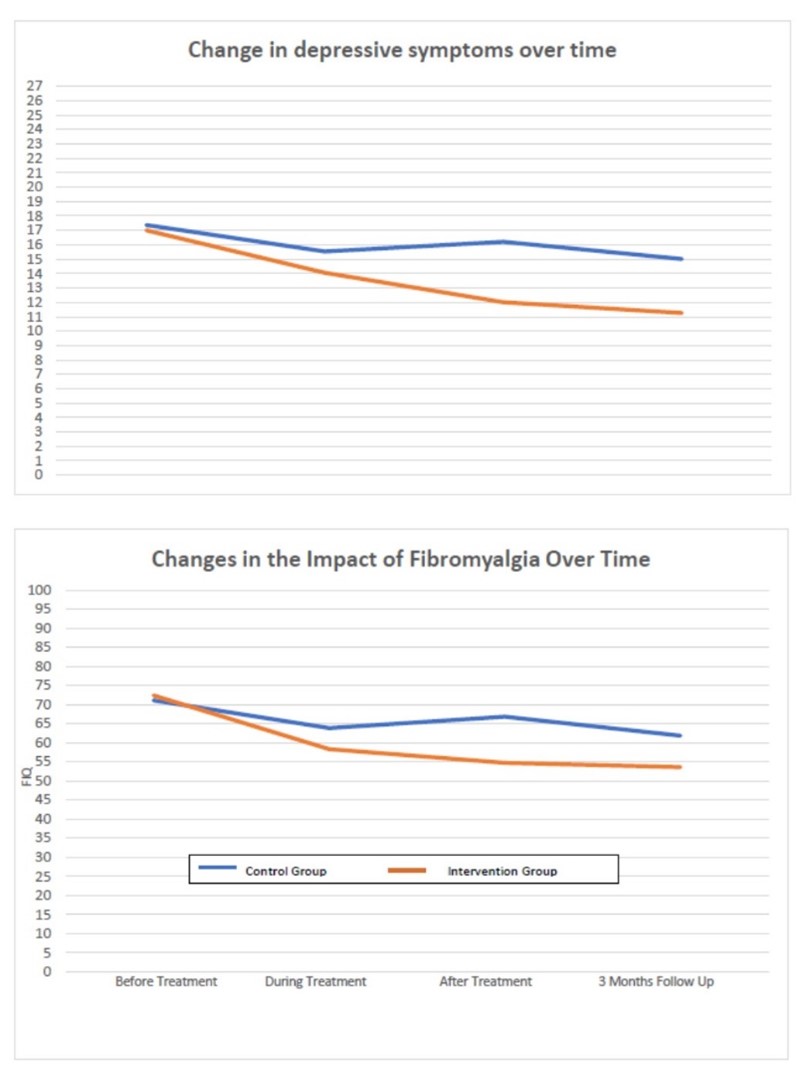Session Information
Date: Saturday, November 6, 2021
Title: Fibromyalgia & Other Clinical Pain Syndromes Poster (0118–0127)
Session Type: Poster Session A
Session Time: 8:30AM-10:30AM
Background/Purpose: Fibromyalgia (FM) and major depression frequently coexist. Patients with both conditions have a worse prognosis and higher disability, and their treatment options are scarce. Behavioral activation (BA) is an evidence-based therapy for depression that is easy to implement and can be implemented as group therapy. Case studies indicate BA may be useful in the management of pain in Fibromyalgia (FM). In this study we aimed to determine the efficacy of group BA for decreasing depressive symptoms and pain intensity in subjects with FM and concomitant depression. This study was funded by a grant from CONICYT (FONIS SA16I0305)
Methods: A randomized controlled trial was performed in which BA in addition to usual care was compared to usual care in women with FM and depression. All subjects included received a stable dose of duloxetine and no other antidepressants. Outcomes were assessed before, during, and after the intervention, as well as at a three months follow-up using the following instruments: Chilean version of the Patients Health Questionnaire-9 (PHQ-9), Composed Pain Intensity Index, Fibromyalgia Impact Questionnaire Revised (FIQ-R), Pain Catastrophizing Scale (PCS), Pain Vigilance and Awareness Questionnaire (PVAQ), Patients Health Questionnaire (PHQ-15), and Activation subscale of the Behavioral Activation for Depression Scale (BADS). Intent to treat analysis was performed. A Hierarchical Linear Model for repeated measures was performed to determine change in all outcomes described and a Cochran-Mantel-Haenszel test was performed to compare the percentage of subjects that had a reduction in 50% of depressive symptoms. This study was approved by the Medicine Scientific Ethics Committee of the Pontificia Universidad Católica de Chile, Santiago, Chile (N 15-221).
Results: There was a significant improvement in depressive symptoms in the regression model (F 4.71 p=0.03). In addition, the outcome greater than 50% decrease in symptoms also showed a significant improvement both at the end of treatment (χ² (1) = 9,43; p = .001) and at the end of follow-up (χ² (1) = 3,83; p= .025). Regarding the impact of FM, FIQ showed significant improvement in multiple regression(F 4.22, p=0.006). Finally, catastrophizing decreased (p 0.035) and behavioral activation increased (p =0.003). Pain (p=0.14) and physical symptoms measured by PHQ-15 did not improve (p=0.059).
Conclusion: BA was effective in improving depression, catastrophizing and decreasing FIQ in subjects with depression and FM, making it a potential therapeutic strategy. However no significant change in pain intensity was seen.
To cite this abstract in AMA style:
Duran J, Verges A, Vázquez-Taboada A, Gonzalez M, Gomez-Pérez L. The Efficacy of Group Behavioral Activation versus Usual Treatment in Patients with Fibromyalgia and Major Depression [abstract]. Arthritis Rheumatol. 2021; 73 (suppl 9). https://acrabstracts.org/abstract/the-efficacy-of-group-behavioral-activation-versus-usual-treatment-in-patients-with-fibromyalgia-and-major-depression/. Accessed .« Back to ACR Convergence 2021
ACR Meeting Abstracts - https://acrabstracts.org/abstract/the-efficacy-of-group-behavioral-activation-versus-usual-treatment-in-patients-with-fibromyalgia-and-major-depression/

